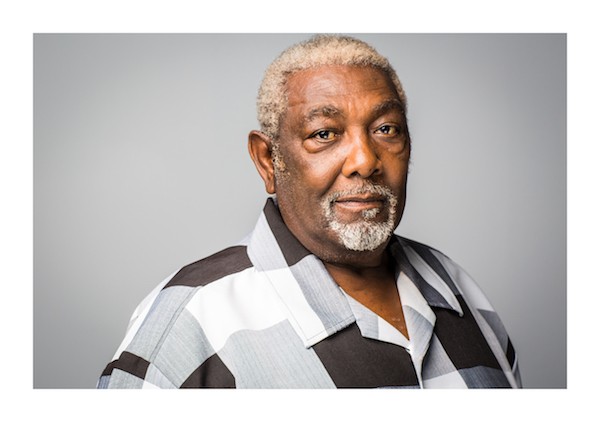Reporting the story of the 1968 Sanitation Workers Strike is a lifelong obsession for journalist-turned-director Emily Yellin. Her parents David and Carol Lynn Yellin were founding members of a group dedicated to reconciliation and commemoration in the wake of the April 4, 1968 assassination of Dr. Martin Luther King Jr. in Memphis. Yellin was six years old at the time. “The first meeting of the Memphis Search for Meaning Committee was in our house on Park Avenue across from Audubon park. I begged my mom to go to the meeting, but she said no. I guess I was persistent enough, so finally she said I could come, but I couldn’t speak, only listen. I could be the secretary, and told me to take notes. At the end of the meeting, she asked to see my notes. The notes read ‘We had a meeting’…I consider that my first reporting work. I reported the facts, and I learned a very important journalism lesson: Listen more than you talk.”
 Darius B. Williams for Striking Voices
Darius B. Williams for Striking Voices
J. L. McClain, a Memphis Sanitation worker who was among the 1968 strikers, is featured in ‘1,300 Men’.
In the 1990s, Yellin was reporting for the New York Times on assassin James Earl Ray’s quest for a new trial. “The big reporter who came to town [from New York] took me out to dinner before we started working on that case. I said to him, ‘Yeah, I’ve been reporting on this since 1968.’”
David Yellin founded the Film and TV department at the University of Memphis. “He had the foresight to go to the TV stations and ask for the film they shot during the sanitation strike. There’s 25 hours of film—it wasn’t video, it was film, much of which they would have thrown away—of the strike and the aftermath.”
Now, 50 years later, Yellin has used that rare footage and combined it with contemporary interviews of 30 surviving strikers and their families for Striking Voices, a multimedia project that tells the stories of the forgotten foot soldiers of the strike that changed Memphis and America. “We’ve gotten our funding from locals who believe in this project,” says Yellin, who organized the nonprofit project with the help of Community LIFT.
The premiere of Yellin’s web series “1,300 Men: Memphis Strike ’68” on TheRoot.com coincided with the 50th anniversary of the beginning of the walkout on February 12th. The 10 episodes trace the story of the strike from the point of view of the men on the streets and the women and children who supported them. “One of our overriding goals was to give a human dimension to these men who, if you knew about them at all, you only knew them as men walking down Main Street carrying I AM A MAN signs. There are whole stories there, and I think it will be very important for everybody to take time to know these people’s stories. It’s a lot deeper than you might have thought.”
 Darius B. Williams for Striking Voices
Darius B. Williams for Striking Voices
Striker Baxter Leach
Yellin’s crew were all Memphians, including editors Laura Jean Hocking, Kevin Brooks, and Suzannah Herbert; producers May Todd, Kierra Turner, Asia Sims, director of photography Richard L. Copley, and photographers Stephen Hildreth and Darius B. Williams. “My instincts told me that, as a white woman who grew up in East Memphis, that I was not necessarily the best person to do this project,” says Yellin. “At every step of the way, I had to consider that and be sure I wasn’t imposing my world view on somebody else’s story.”
This Sunday, April 22nd, “1,300 Men” will screen at the Benjamin L. Hooks Library. “We’re really looking forward to Sunday, because that’s our chance to show what we’ve produced for a national audience to a local audience. We’re gong to binge watch the story that we created for The Root for a local audience, and we’re going to have some of the sanitation workers and their wives there for a talk,” says Yellin.
In addition to the “1,300 Men” screening, an photography exhibit called “Striking Voices: The Portraits and Interviews” will be on display at the library adjacent to the screening room. “We interviewed more than 30 people, the men, their wives, and their children. Everyone we interviewed, Darius B. Williams took portrait photographs,” says Yellin.
Putting this long-gestating project together brought home the immediacy of the Civil Rights era, and the work that continues to be needed in Memphis. “There’s a legacy of [white supremacy] that we’re living with here more than almost any other city in the country,” says Yellin. “We think of the the legacies of slavery and Jim Crow as being something that happened to another generation. But what I really see is that it’s still happening in our generation right now.”